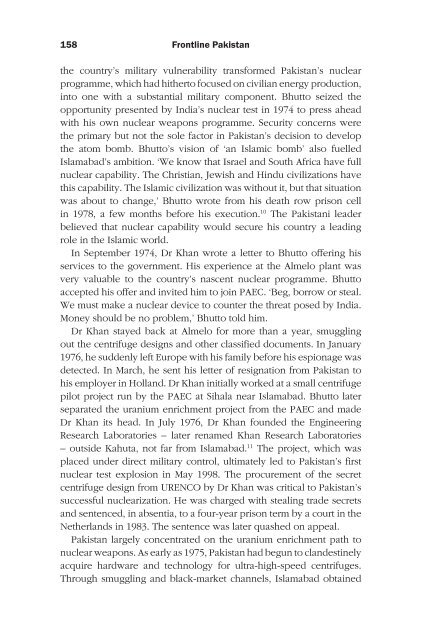Frontline Pakistan : The Struggle With Militant Islam - Arz-e-Pak
Frontline Pakistan : The Struggle With Militant Islam - Arz-e-Pak
Frontline Pakistan : The Struggle With Militant Islam - Arz-e-Pak
Create successful ePaper yourself
Turn your PDF publications into a flip-book with our unique Google optimized e-Paper software.
1 <strong>Frontline</strong> <strong><strong>Pak</strong>istan</strong><br />
the country’s military vulnerability transformed <strong><strong>Pak</strong>istan</strong>’s nuclear<br />
programme, which had hitherto focused on civilian energy production,<br />
into one with a substantial military component. Bhutto seized the<br />
opportunity presented by India’s nuclear test in 1974 to press ahead<br />
with his own nuclear weapons programme. Security concerns were<br />
the primary but not the sole factor in <strong><strong>Pak</strong>istan</strong>’s decision to develop<br />
the atom bomb. Bhutto’s vision of ‘an <strong>Islam</strong>ic bomb’ also fuelled<br />
<strong>Islam</strong>abad’s ambition. ‘We know that Israel and South Africa have full<br />
nuclear capability. <strong>The</strong> Christian, Jewish and Hindu civilizations have<br />
this capability. <strong>The</strong> <strong>Islam</strong>ic civilization was without it, but that situation<br />
was about to change,’ Bhutto wrote from his death row prison cell<br />
in 1978, a few months before his execution. 10 <strong>The</strong> <strong><strong>Pak</strong>istan</strong>i leader<br />
believed that nuclear capability would secure his country a leading<br />
role in the <strong>Islam</strong>ic world.<br />
In September 1974, Dr Khan wrote a letter to Bhutto offering his<br />
services to the government. His experience at the Almelo plant was<br />
very valuable to the country’s nascent nuclear programme. Bhutto<br />
accepted his offer and invited him to join PAEC. ‘Beg, borrow or steal.<br />
We must make a nuclear device to counter the threat posed by India.<br />
Money should be no problem,’ Bhutto told him.<br />
Dr Khan stayed back at Almelo for more than a year, smuggling<br />
out the centrifuge designs and other classified documents. In January<br />
1976, he suddenly left Europe with his family before his espionage was<br />
detected. In March, he sent his letter of resignation from <strong><strong>Pak</strong>istan</strong> to<br />
his employer in Holland. Dr Khan initially worked at a small centrifuge<br />
pilot project run by the PAEC at Sihala near <strong>Islam</strong>abad. Bhutto later<br />
separated the uranium enrichment project from the PAEC and made<br />
Dr Khan its head. In July 1976, Dr Khan founded the Engineering<br />
Research Laboratories – later renamed Khan Research Laboratories<br />
– outside Kahuta, not far from <strong>Islam</strong>abad. 11 <strong>The</strong> project, which was<br />
placed under direct military control, ultimately led to <strong><strong>Pak</strong>istan</strong>’s first<br />
nuclear test explosion in May 1998. <strong>The</strong> procurement of the secret<br />
centrifuge design from URENCO by Dr Khan was critical to <strong><strong>Pak</strong>istan</strong>’s<br />
successful nuclearization. He was charged with stealing trade secrets<br />
and sentenced, in absentia, to a four-year prison term by a court in the<br />
Netherlands in 1983. <strong>The</strong> sentence was later quashed on appeal.<br />
<strong><strong>Pak</strong>istan</strong> largely concentrated on the uranium enrichment path to<br />
nuclear weapons. As early as 1975, <strong><strong>Pak</strong>istan</strong> had begun to clandestinely<br />
acquire hardware and technology for ultra-high-speed centrifuges.<br />
Through smuggling and black-market channels, <strong>Islam</strong>abad obtained













